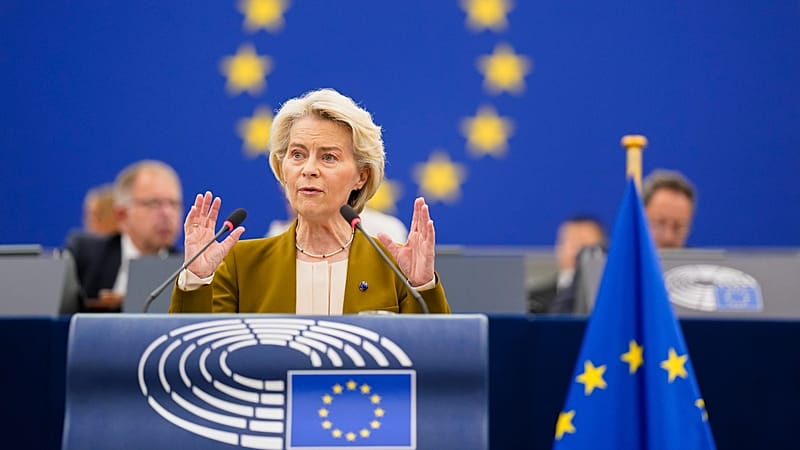
Europe must keep the pressure on Russia because the country remains intent on "permanently redrawing maps" and bringing back its lost "spheres of influence", Ursula von der Leyen said on Wednesday, as fast-paced peace talks led by the United States raise the prospect of economic relief for Moscow despite its continued assault on Ukraine.
"From the start, Russia has always believed that they can outlast Ukraine, Europe and all of its allies," the European Commission president told the European Parliament in Strasbourg in a speech on Wednesday morning.
"And it is why every time there is serious progress towards negotiations that can bring about a real peace, the violence escalates," she went on, referring to the recent barrage of Russian strikes against Ukraine's civilian population.
"We have seen this before. This is a pattern. And the noises from the Kremlin in the last few days say a lot about its real intentions. For them, Ukraine remains a first step in a much bigger game."
Peace or capitulation?
Von der Leyen's remarks come as the Kremlin signals its intention to reject the peace plan that emerged from talks between American and Ukrainian officials in Geneva over the weekend.
The negotiations considerably modified the terms of the original 28-point draft, which contained sweeping provisions that favoured Moscow's interests.
Europeans, who were not consulted before the 28-point template leaked to the press, were aghast at the proposals affecting crucial matters under their jurisdiction, such as the future of economic sanctions and the fate of immobilised Russian assets.
The past few days have seen a frenzy of high-level contacts, including an informal meeting of EU leaders on Monday and a virtual gathering of the "Coalition of the Willing" on Tuesday, aimed at strengthening Europe's voice and helping Kyiv rebalance the text.
"This principle has been accepted," von der Leyen said. "Nothing about Ukraine without Ukraine. Nothing about Europe without Europe. Nothing about NATO without NATO."
In her speech, von der Leyen argued against limiting the size of the Ukrainian armed forces, a contentious topic in the talks, and urged robust security guarantees to prevent a repeat of the full-scale invasion.
Western allies are considering deploying a multinational force on Ukrainian soil to boost deterrence once the war is over. Moscow has rejected the idea outright.
"We know that Russia's mindset has not changed since the days of Yalta, seeing our continent in terms of spheres of influence," von der Leyen told MEPs.
"So we need to be clear that there cannot be a unilateral carving up of a sovereign European nation. And that borders cannot be changed by force. If today we legitimise and formalise the undermining of borders, we open the doors for more wars tomorrow."
Footing the bill
As the diplomatic fracas over the US-Russia plan moves centre stage, von der Leyen underlined the urgency to support Ukraine's financial and military needs, estimated at €135 billion for 2026 and 2027.
Last week, the European Commission presented a document with three options to plug the gap: bilateral contributions from member states, common borrowing at the EU level, and a so-called reparations loan based on the immobilised assets of the Russian Central Bank. The assets are worth about €210 billion across the bloc.
EU leaders are meant to make a decision when they meet again on 18 December.
While the majority of capitals favour the reparations loan, as it would spare their budgets from footing the bill, the unprecedented project has been met with resistance from Belgium, which holds the bulk of the assets and fears Moscow's aggressive retaliation.
Von der Leyen confirmed her Commission was ready to put forward a legal text to underpin the loan, one of Belgium's key demands.
"To be very clear, I cannot see a scenario in which the European taxpayers alone will pay the bill," she said, expressing her preference for the reparations loan.
"Another thing must also be clear: any decision on this needs to be taken in line with the rules of the responsible jurisdictions, and will respect European and international law."
It remains to be seen whether the peace effort will encourage Belgium lift its reservations or hold its ground even more firmly. The original 28-point plan proposed a model that would allow Washington and Moscow to profit from the immobilised assets.
The controversial model is believed to have been removed after the Geneva talks, and further negotiations are pending.
Von der Leyen concluded her speech by doubling down on her call to ramp up pressure on Moscow and compel the country to end the war.
Since February 2022, the EU has imposed 19 packages of sanctions on Russia. Last month, the US sanctioned Russia's two largest oil companies, Rosneft and Lukoil.
"Yes, the situation is complex. Yes, the situation is volatile. Yes, the situation is dangerous. But I believe there is also an opportunity to make real progress," von der Leyen said.
"It is our duty to engage with any and all efforts that can bring about a just and lasting peace. We know it will not be easy. But we have to find a way to move forward."







